- Vulnerability: A critical authorization bypass flaw (CVE-2025-29927) has been identified in Next.js, a popular React framework.
- Severity: Rated 9.1 (CRITICAL) on the CVSS scale.1
- Affected Versions: Versions prior to 14.2.25 and 15.2.3.
- Impact: Attackers can bypass authorization checks in middleware, potentially accessing restricted areas of applications.
- Fix: Upgrade to Next.js 14.2.25 or 15.2.3. A workaround involves blocking requests with the
x-middleware-subrequestheader.
What is the Vulnerability?
The vulnerability arises when authorization checks are implemented in Next.js middleware. Attackers can exploit this flaw to bypass these checks, potentially gaining unauthorized access to restricted areas of an application. This is particularly concerning for applications that rely on middleware to enforce access control for sensitive routes or data.2
According to the GitHub Security Advisory, the issue stems from improper handling of the x-middleware-subrequest header. If this header is manipulated, attackers can trick the middleware into allowing unauthorized requests.3
Affected Versions and Patches
- 14.x: Versions prior to 14.2.25
- 15.x: Versions prior to 15.2.3
Developers are strongly advised to upgrade to the patched versions, 14.2.25 or 15.2.3, to mitigate the risk. For those unable to update immediately, a temporary workaround involves blocking external requests containing the x-middleware-subrequest header.4
Why This Matters
Next.js is a cornerstone of modern web development, powering millions of applications worldwide. This vulnerability highlights the importance of robust security practices, especially in frameworks that handle sensitive user data. The flaw could allow attackers to access restricted areas, modify data, or even elevate their privileges within an application.5
Given the framework’s popularity, this flaw could have far-reaching consequences if left unpatched.
Spokesperson from Truesec6
Context and Similar Vulnerabilities
This is not the first time Next.js has faced security challenges. In December 2024, a similar vulnerability (CVE-2024-51479) was discovered, allowing attackers to bypass authorization checks based on pathnames.7 That issue affected versions 9.5.5 through 14.2.14 and was patched in version 14.2.15. The recurrence of such vulnerabilities underscores the need for continuous security audits and prompt updates.
Recommendations
- Upgrade Immediately: Developers should update their Next.js applications to version 14.2.25 or 15.2.3.
- Implement Workarounds: If upgrading is not feasible, block requests containing the
x-middleware-subrequestheader. - Conduct Security Audits: Review middleware and route protection strategies to ensure robust security measures are in place.
- Monitor Access Logs: Keep an eye on access logs for any signs of unauthorized activity.
Conclusion
The discovery of CVE-2025-29927 serves as a stark reminder of the evolving nature of cybersecurity threats. While the Next.js team has acted swiftly to address the issue, developers must remain vigilant. Regularly updating dependencies and conducting thorough security reviews are essential practices to safeguard applications against such vulnerabilities.
As the digital landscape continues to grow, so too does the importance of proactive security measures. This incident reinforces the need for developers to stay informed about potential risks and take timely action to protect their applications and users.
References
- [1] GitHub Security Advisory (2025): Authorization Bypass in Next.js Middleware
- [2] Truesec (2025): Critical Next.js Authorization Bypass Vulnerability
- [3] Vulners (2025): CVE-2025-29927 – Vulnerability Database
- [4] GBHackers (2025): Next.js Vulnerability Let Attackers Bypass Authentication
- [5] Cyber Press (2025): Next.js Authentication Bypass Vulnerability Impacts Millions of Developers
- [6] Meterian (2025): Componentpedia: Next.js 14.2.5 Issues and Vulnerabilities
- [7] GitHub Security Advisory (2024): Authorization Bypass in Next.js
Keywords: Next.js, CVE-2025-29927, authorization bypass, middleware, React framework, cybersecurity, vulnerability, CVSS 9.1, x-middleware-subrequest, web development.






